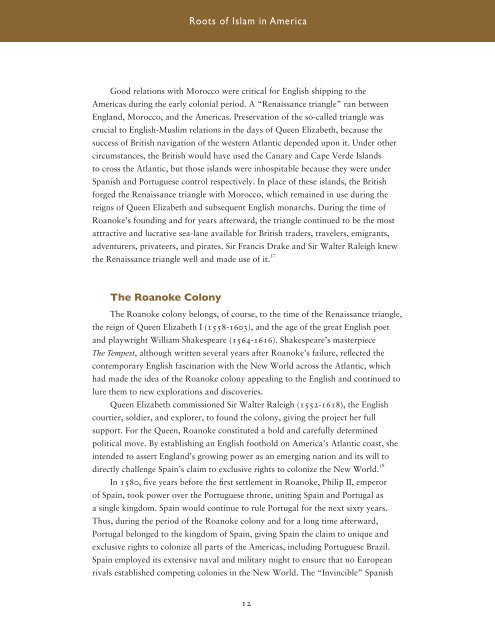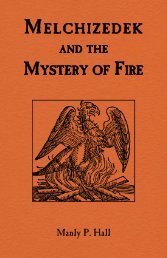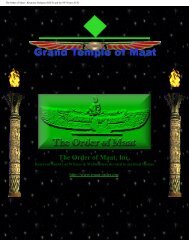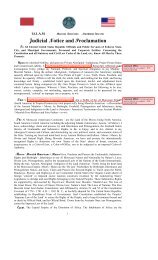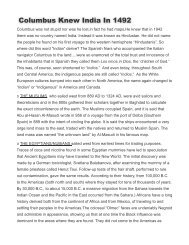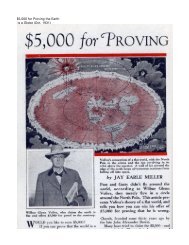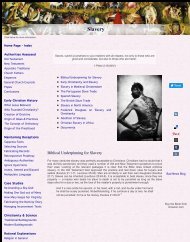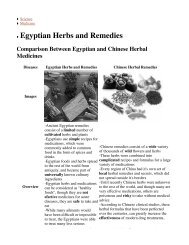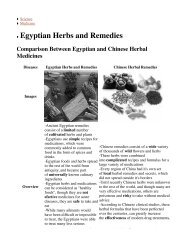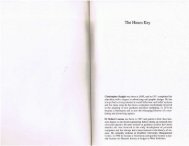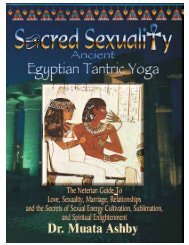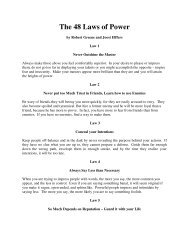Turks,Moors,& Moriscos in Early America
You also want an ePaper? Increase the reach of your titles
YUMPU automatically turns print PDFs into web optimized ePapers that Google loves.
!""#$%"&%'$()*%+,%-*./+0)<br />
Good relations with Morocco were critical for English shipp<strong>in</strong>g to the<br />
<strong>America</strong>s dur<strong>in</strong>g the early colonial period. A “Renaissance triangle” ran between<br />
England, Morocco, and the <strong>America</strong>s. Preservation of the so-called triangle was<br />
crucial to English-Muslim relations <strong>in</strong> the days of Queen Elizabeth, because the<br />
success of British navigation of the western Atlantic depended upon it. Under other<br />
circumstances, the British would have used the Canary and Cape Verde Islands<br />
to cross the Atlantic, but those islands were <strong>in</strong>hospitable because they were under<br />
Spanish and Portuguese control respectively. In place of these islands, the British<br />
forged the Renaissance triangle with Morocco, which rema<strong>in</strong>ed <strong>in</strong> use dur<strong>in</strong>g the<br />
reigns of Queen Elizabeth and subsequent English monarchs. Dur<strong>in</strong>g the time of<br />
Roanoke’s found<strong>in</strong>g and for years afterward, the triangle cont<strong>in</strong>ued to be the most<br />
attractive and lucrative sea-lane available for British traders, travelers, emigrants,<br />
adventurers, privateers, and pirates. Sir Francis Drake and Sir Walter Raleigh knew<br />
the Renaissance triangle well and made use of it. 57<br />
17.%!"),"3.%:"(",@<br />
The Roanoke colony belongs, of course, to the time of the Renaissance triangle,<br />
the reign of Queen Elizabeth I (1558-1603), and the age of the great English poet<br />
and playwright William Shakespeare (1564-1616). Shakespeare’s masterpiece<br />
The Tempest, although written several years after Roanoke’s failure, reflected the<br />
contemporary English fasc<strong>in</strong>ation with the New World across the Atlantic, which<br />
had made the idea of the Roanoke colony appeal<strong>in</strong>g to the English and cont<strong>in</strong>ued to<br />
lure them to new explorations and discoveries.<br />
Queen Elizabeth commissioned Sir Walter Raleigh (1552-1618), the English<br />
courtier, soldier, and explorer, to found the colony, giv<strong>in</strong>g the project her full<br />
support. For the Queen, Roanoke constituted a bold and carefully determ<strong>in</strong>ed<br />
political move. By establish<strong>in</strong>g an English foothold on <strong>America</strong>’s Atlantic coast, she<br />
<strong>in</strong>tended to assert England’s grow<strong>in</strong>g power as an emerg<strong>in</strong>g nation and its will to<br />
directly challenge Spa<strong>in</strong>’s claim to exclusive rights to colonize the New World. 58<br />
In 1580, five years before the first settlement <strong>in</strong> Roanoke, Philip II, emperor<br />
of Spa<strong>in</strong>, took power over the Portuguese throne, unit<strong>in</strong>g Spa<strong>in</strong> and Portugal as<br />
a s<strong>in</strong>gle k<strong>in</strong>gdom. Spa<strong>in</strong> would cont<strong>in</strong>ue to rule Portugal for the next sixty years.<br />
Thus, dur<strong>in</strong>g the period of the Roanoke colony and for a long time afterward,<br />
Portugal belonged to the k<strong>in</strong>gdom of Spa<strong>in</strong>, giv<strong>in</strong>g Spa<strong>in</strong> the claim to unique and<br />
exclusive rights to colonize all parts of the <strong>America</strong>s, <strong>in</strong>clud<strong>in</strong>g Portuguese Brazil.<br />
Spa<strong>in</strong> employed its extensive naval and military might to ensure that no European<br />
rivals established compet<strong>in</strong>g colonies <strong>in</strong> the New World. The “Inv<strong>in</strong>cible” Spanish<br />
12


